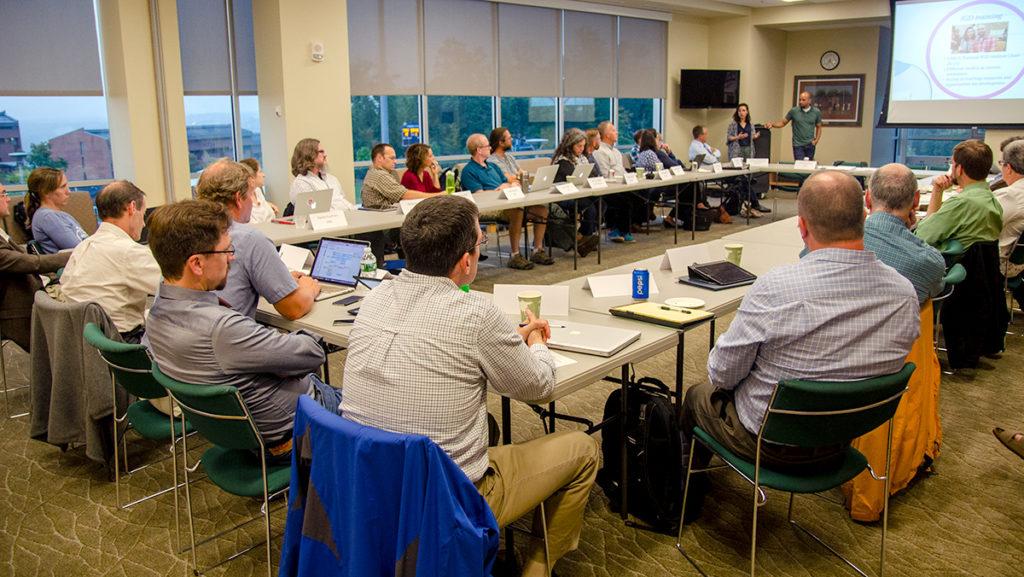Tensions were high at the March 8 Ithaca College Faculty Council meeting, which took place only a day after the college celebrated the announcement of La Jerne Cornish as the college’s 10th president.
At the meeting, the end of the college’s COVID-19 mask mandate and shared governance were discussed. However, the council did not discuss the appointment of Cornish from interim president to president.
Open session
During the meeting’s opening session, Thomas Pfaff, professor and chair in the Department of Mathematics, began by criticizing the faculty leadership for shielding the college’s administration from public questions.
“We have no ability to ask questions and to get live answers and follow up or have any discussion in public,” Pfaff said. “We’re not allowed to ask questions other than clarifying questions.”
Shortly after Pfaff spoke, Ari Kissiloff, assistant professor in the Department of Strategic Communication, interrupted Chris McNamara, clinical associate professor, clinic director in the Department of Physical Therapy and chair of the faculty council, and made a mocking gesture. Raul Palma, assistant professor in the Department of Writing, criticized Kissiloff for his gestures, saying he needed to stand up for the integrity of the council.
Mask mandate
On March 4, Ithaca College dropped its face mask mandate for everyone on campus, regardless of vaccination status. In her report to the council, Interim Provost Melanie Stein said she recognizes the concerns that students and faculty have about the mandate being dropped. Stein said she will continue to hear concerns.
“I have had a lot of conversations [about the mandate] over the past four or five days,” Stein said. “It’s very clear to me that people are all over the place. The most important thing that we can do is to remember that we always try to be an inclusive community.”
Samm Swarts, director for Emergency Preparedness and Response, said that because of low COVID-19 transmission rates in the county — 12 new cases were reported countywide March 8, compared to 292 cases on Jan. 13 — the campus is not at risk of community spread. Swarts said the college will provide free KN95 masks to students, and for students returning from break, there will be a requirement of showing a negative test within 72 hours of returning to classes March 21.
“We are going to be asking that they [students] must test when they return to campus,” Swarts said. “If they’re feeling sick, or ill over the break period we will ask that they do stay home until they have recovered. Please continue to work with students.”
However, faculty raised concerns that the lack of a mask mandate would put students who are immunocompromised at unnecessary risk. Lynne Hewitt, professor and chair in the Department of Speech Language Pathology and Audiology, said her students were disappointed by the timing of the mask mandate being dropped, as spring break is next week, a time where students travel home or go on vacation.
“I took a poll with comments [in class] and I was surprised by the results,” Hewitt said. “Out of 21 students, 5% wanted to drop the mask mandate, 55% wanted to keep it, and 40% didn’t care either way. I was fully blown away by the concern and the desire to continue to mandate masks.”
Additionally, faculty also raised concerns that the lack of a mask mandate would affect their student evaluations at the end of the year, which are part of the college’s process for determining tenure status. Paloma Barhaugh-Bordas, assistant professor in the Department of Art, said that since COVID-19 has become such a politicized issue in America, a professor’s mask rules may make them unpopular among their students.
“I don’t think educators should be in the position of being enforcers,” Barhaugh-Bordas said. “I think that is something that should stay more institutional, because it puts us [faculty] in an awkward position.”
Shared governance
The faculty council’s discussion of COVID-19 mask policy lasted longer than the council had anticipated, and as a result, the topic of shared governance did not get as much time as was allotted to in the meeting’s agenda. At the end of the meeting, the council voted to adjourn at its regularly scheduled 9 p.m. ending time, rather than extend the meeting to continue discussing shared governance.
However, Kissiloff made a brief statement, saying the council needs to think about the idea of shared governance.
“We really need to talk about what shared governance means,” Kissiloff said. “I hope that my message today starts a conversation. I hope Ithaca College can be an example of what it means to have shared governance.”








